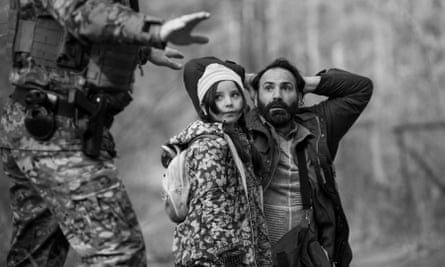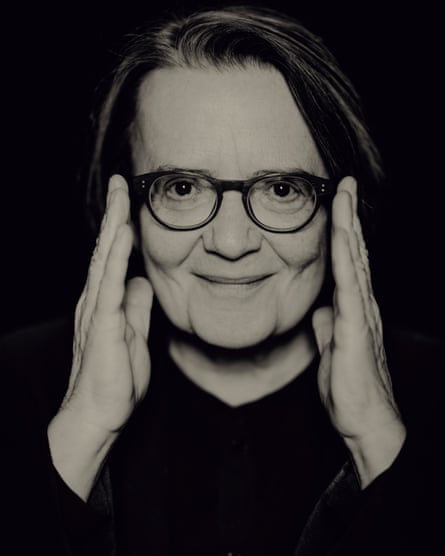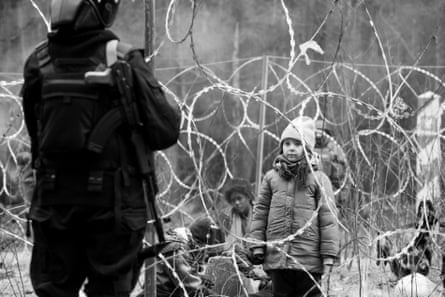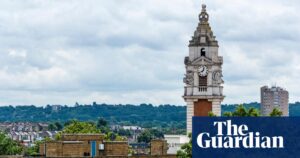Director Agnieszka Holland is accustomed to attacks from the right in Poland, but her latest film, Green Border – about the plight of immigrants on the country’s borders – took things to another level. No sooner had it premiered at last year’s Venice film festival, where it won the special jury prize, than the justice minister, Zbigniew Ziobro, took to social media, comparing it to Nazi propaganda. President Andrzej Duda doubled down, resurrecting a second world war slogan about the gullibility of filmgoers: “Only pigs sit in cinemas.”
The film that caused all the fuss is an uncompromising work of conscience, set in a no man’s land between Poland and Belarus, where refugees, largely from the Middle East and Africa, have for the last three years become pawns in a geopolitical standoff between the European Union and a Russian ally intent on destabilising it. In stark black and white, Green Border shows families being bundled back and forth through the barbed-wire fences, left to freeze and starve and – in one shocking scene – drown in the mud of one of Europe’s last primeval forests.
Holland’s cast includes Syrian and African actors who had made the journey for real themselves. In the run-up to a Polish election last year, in which immigration was a rallying point, tensions were so high that she had to film Green Border in secret locations, delegating sections to two associate directors, so that all the shooting could be completed in just 24 days. “We didn’t ask for a grant from the Polish Film Institute, knowing what the attitude of the governmental institution was to that subject: it was totally forbidden,” she says.

The 75-year-old director is in Prague when we speak, working on a biopic of Franz Kafka. Across a career that has landed her three Oscar nominations – as well as prestigious guest-directing gigs on TV series including The Wire and House of Cards – Holland has specialised in turning over the stones in the darkest corners of European history. She has tackled the Holocaust (Europa Europa and In Darkness) and the Holodomor famine in 1930s Ukraine (Mr Jones). In conversation, she conjures apocalyptic scenarios with a disarming matter-of-factness. “I spent about 10 years of my life in the 1930s and 40s of the last century, so the beginning of the growing of the serpent’s egg is something which I think I’m very sensitive to,” she says, co-opting a metaphor for the birth of tyranny from Shakespeare’s Julius Caesar.
The event that seeded Green Border in her mind was the 2015 migration crisis, in which 1.3 million people, mainly Syrian, requested asylum in Europe. From that moment, she says, the continent began to lose faith with the consensual values it had forged in the aftermath of the second world war – one notable symptom being the UK’s Brexit vote. “I realised how weak Europe is in its response to that kind of crisis; how easy it is to break the laws protecting human rights which we are so proud of, and become susceptible to external blackmail,” she says. “It became very clear that migration is the easiest tool for an outside regime to use to break the stability of the European Union.”
But equally disturbing to her was Poland’s reaction, which was to seal off a huge tract of forest as a no man’s land patrolled by troops. “At that moment, when the border of one country becomes the laboratory of legalised violence and lies, the danger – and the dehumanisation of the people involved – is quite obvious,” she says. “What was shocking to me is how easily the media accepted the ban.”
When Jarosław Kaczyński, Poland’s deputy prime minister at the time, declared that the Americans lost the war in Vietnam because they allowed the media to go there, she found her fire. “I understood that this man believed in the power of images. And as it’s also my vocation to believe in the power of images, I thought to myself: ‘OK, I will create the images which reflect what’s really going on.’ It was some kind of anger, you know, that triggered my decision to make the film. But I also felt I had a duty to do so.”

As Green Border makes clear, the dehumanisation applies not only to the refugees but to the soldiers charged with keeping them out. Against them, Holland pits a new generation of resistance workers, dedicated to smuggling food and medical supplies to the fugitives, while acutely aware of the limitations of what they can achieve. Don’t try to smuggle them out, an idealistic new recruit is warned, because if you are caught, the whole operation will be busted. The result, as Guardian reviewer Peter Bradshaw pointed out, is a film that combines an old-fashioned war movie with a dystopian thriller.
Holland’s own understanding of political resistance started in her earliest years. Her Catholic mother took part in the 1944 Warsaw uprising and received a medal from Israel’s Yad Vashem institute for rescuing Jews in the Holocaust. Her Jewish father, the writer and activist Henryk Holland, lost both his parents in the second world war and invested all his hopes in communist activism, but died in suspicious circumstances, when Agnieszka was just 13, after being wrongly accused of espionage. At the age of 15, she decided to become a film director, “because film seemed to be living up to Lenin’s famous definition as ‘the most important of the arts’”.
Partly because of her lifelong love of Kafka, she says, she went to film school in Czechoslovakia, where she witnessed the Prague spring and was imprisoned for dissident activity. Returning home, she became an assistant to the great Polish directors Krzysztof Zanussi and Andrzej Wajda, from whom she learned the value of cinema to “tell stories about the contemporary world and voice our collective anger”.

The last time Holland’s work attracted the ire of the Polish right was in 2017, with a film bursting with just such qualities. Spoor (Pokot, in Poland), an adaptation of Drive Your Plow Over the Bones of the Dead, by the Nobel prize-winning novelist Olga Tokarczuk, was an expressionist eco-thriller that pitted animal rights activists against the macho authoritarianism of the culture. Internationally it was well received, winning the Silver Bear at the Berlin film festival; back home, both director and writer were denounced as “targowiczanin”, a communist-era term for traitor.
after newsletter promotion
“Yes, I had some troubles with Pokot,” she says. “But while animal rights and ecology are sensitive issues, they are somehow limited. When you touch on the safety of our borders, and our comfort, then it becomes a real fear. And, you know, Europe is afraid and the US is afraid. Most of those rich places are afraid, and my opinion is that they don’t believe in the future. You can see it with the demography: the people don’t want to procreate, while at the same time, you have that other fear about allowing the victims of the climate crisis to come inside.”
For the political film-maker there is an upside to such controversies, she points out. When Green Border opened in Poland the president’s pig metaphor became a meme, with moviegoers all over the country inviting each other to become a pig with them. The result was that 800,000 people flocked to see it, making it the year’s 11th most popular film in Poland, ahead of The Little Mermaid and John Wick: Chapter 4. “Especially with that kind of movie, which is not light entertainment, it was insane,” Holland says.
The film went on general release in Poland a month before a state election that ousted the rightwing politicians who had condemned it. Does she think it played a part in that rout? “Of course it wasn’t crucial,” she replies, “but I’m sure it probably played some role, because people have been very moved by the film. Somehow it was like an awakening to the fact that we can speak not only about pragmatic politics but also about human values. In that moment we started to feel empowered.”
As to whether things have really changed, she is less convinced. “The language is different but, frankly, I think the new government doesn’t have any more idea how to deal with migration than the rest of Europe. We’re at a really dangerous moment. As soon as we start to bomb the boats on the Mediterranean instead of just pushing them away from the shore, it will be the end of a Europe of human rights.”
Does she really think that might happen? She answers a question with a question. “Isn’t it a logical consequence? Yes. Without a collective effort of conscience and will, I think that we are facing the possibility of a massive crime against humanity.”
Green Border is in cinemas 21 June.
Source: theguardian.com





















